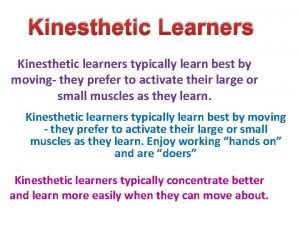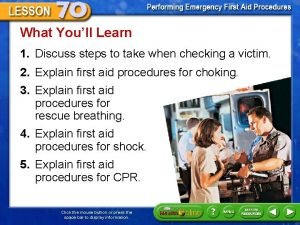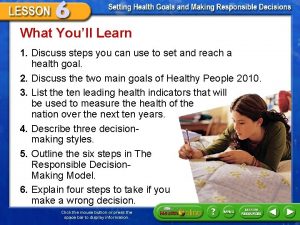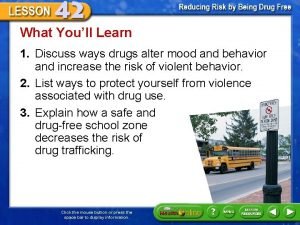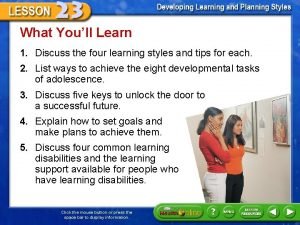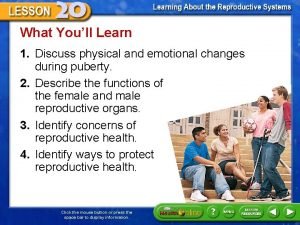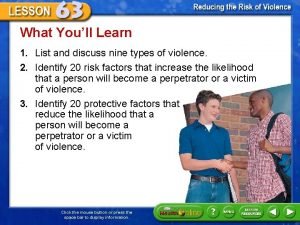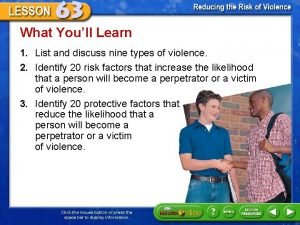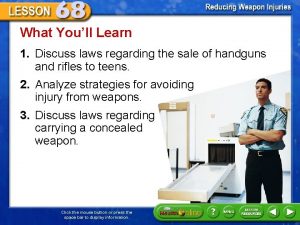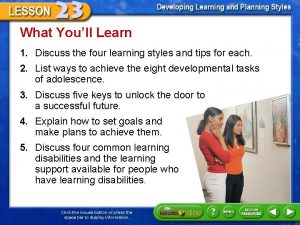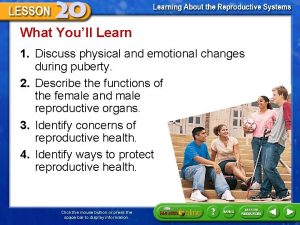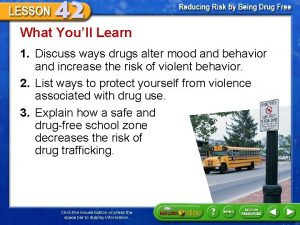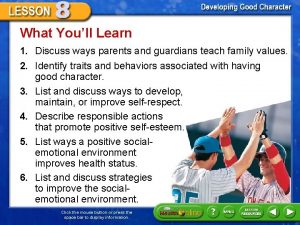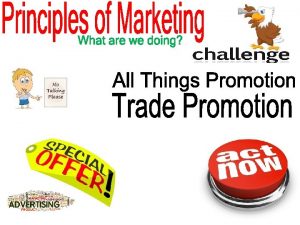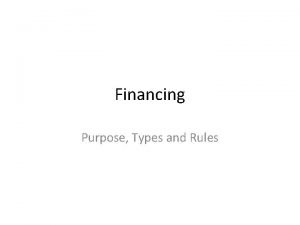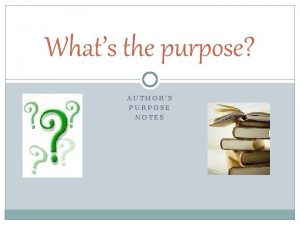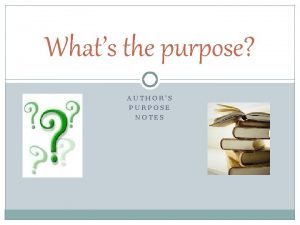What Youll Learn 1 Discuss the purpose of





























- Slides: 29

What You’ll Learn 1. Discuss the purpose of a health behavior inventory. 2. Discuss healthful behaviors. 3. Give examples of risk behaviors. 4. List the six categories of risk behaviors in teens. 5. List the five parts of a health behavior contract. Click the mouse button or press the space bar to display information.

Key Terms • • • behavior habits healthful behaviors risk behaviors health behavior inventory • health behavior contract Click the mouse button or press the space bar to display information.

Health Behavior Inventories • A behavior is the way you act or choose to act in a situation. • Habits are fixed behaviors that you use automatically. Click the mouse button or press the space bar to display information.

Health Behavior Inventories • Healthful behaviors are behaviors that promote health, prevent injury and premature death, and improve the quality of the environment. • Risk behaviors are behaviors that threaten health, can cause injury or premature death and harm, or destroy the environment. Click the mouse button or press the space bar to display information.

The Value of a Health Behavior Inventory • You can have optimal health. – Practicing healthful behaviors and avoiding risk behaviors helps you to maintain optimal health status. – A health behavior inventory is a tool that helps a person decide how well he or she is practicing healthful behaviors. Click the mouse button or press the space bar to display information.

The Value of a Health Behavior Inventory Six Categories of Risk Behaviors in Teens These behaviors threaten health, can cause injury or premature death, and/or destroy the environment: • Behaviors that result in unintentional and intentional injuries • Tobacco use • Alcohol and other drug abuse • Sexual behaviors that result in HIV infection or other sexually transmitted diseases and in unplanned pregnancies • Diet choices that contribute to disease • Lack of physical activity Click the mouse button or press the space bar to display information.


Completing a Health Behavior Inventory • You can use this inventory to become aware of healthful behaviors that you already practice and discover new habits that could improve your health status. Click the mouse button or press the space bar to display information.

How to Complete a Health Behavior Inventory • To take the inventory, number from 1 to 100 on a sheet of paper. • Click here to read each behavior (or refer to pages 28– 31 of your textbook). Write yes or no next to the same number on your paper. – Each yes indicates a behavior you practice. – Each no indicates a behavior you do not currently practice on a regular basis. Click the mouse button or press the space bar to display information.

How to Complete a Health Behavior Inventory • Review your responses and plan to continue each healthful behavior that you already practice. • Make a list of the healthful behaviors that you do not yet practice. • Select one and set realistic steps to achieve the goal of practicing this healthful behavior. Click the mouse button or press the space bar to display information.

Health Behavior Contracts • A health behavior contract is a written plan that a person makes in which he or she agrees to develop the habit of practicing a specific healthful behavior. • The healthful behavior you want to practice becomes a health goal. Click the mouse button or press the space bar to display information.

How to Create a Health Behavior Contract • The five steps to follow when making a health behavior contract are: 1. Write your name and the date. 2. Write the healthful behavior you want to practice as a health goal. 3. Write specific statements that describe how this healthful behavior reduces health risks. 4. Make a specific plan for recording your progress. 5. Complete the evaluation of how the plan helped you accomplish the health goal. Click the mouse button or press the space bar to display information.

Study Guide 1 I, 5 D 1. Match the following terms and definitions. ___ C behavior ___ B healthful behavior ___ D habit ___ A risk behavior A. health-threatening behavior that can cause injury or early death, or harm the environment B. health-promoting behavior that can prevent injury and early death or improve the environment C. way of acting in a situation D. a fixed, automatic behavior Click the mouse button or press the space bar to display information.

Study Guide 1 I, 5 A, 5 D 2. Identify whether the following statements are true or false. _______ false Healthful behaviors in the health behavior inventory are of equal value. _______ A health behavior contract is a written plan true to develop the habit of practicing a healthful behavior. _______ Lack of physical activity is a risk behavior true in teens. _______ false A habit is the way you act or choose to act in a situation. Click the mouse button or press the space bar to display information.

Study Guide 5 D 3. List the six categories of risk behaviors in teens. 1. Behaviors that result in unintentional and intentional injuries 2. Tobacco use 3. Alcohol and other drug abuse 4. Sexual behaviors that result in HIV infection or other sexually transmitted diseases and in unplanned pregnancies 5. Diet choices that contribute to disease 6. Lack of physical activity Click the mouse button or press the space bar to display information.


Health Behavior Inventory Mental and Emotional Health 1. I will develop good character. 2. I will interact in ways that help create a positive social-emotional environment. 3. I will develop healthful personality characteristics. 4. I will choose behaviors that promote a healthy mind. 5. I will express emotions in healthful ways. 6. I will use stress-management skills. 7. I will seek help if I feel depressed. 8. I will use suicide prevention strategies when appropriate. 9. I will cope with loss and grief in healthful ways. 10. I will be resilient during difficult times.

Family and Social Health 11. I will develop healthful family relationships. 12. I will work to improve difficult family relationships. 13. I will make healthful adjustments to family changes. 14. I will develop healthful friendships. 15. I will develop healthful dating skills. 16. I will choose to practice abstinence from sex. 17. I will recognize harmful relationships. 18. I will develop skills to prepare for marriage. 19. I will develop skills to prepare for parenthood. 20. I will choose to practice abstinence from sex to avoid the risks of teen marriage and parenthood.

Growth and Development 21. I will keep my body systems healthy. 22. I will recognize habits that protect female reproductive health. 23. I will recognize habits that protect male reproductive health. 24. I will learn about pregnancy and childbirth. 25. I will learn about the growth and development of infants and children. 26. I will provide responsible care for infants and children. 27. I will develop my learning style. 28. I will achieve the developmental tasks of adolescence. 29. I will develop habits that promote healthful aging. 30. I will share my feelings with my family about dying and death.

Nutrition 31. I will select foods that contain nutrients. 32. I will evaluate food labels. 33. I will eat the recommended servings from the Food Guide Pyramid. 34. I will follow the Dietary Guidelines when I eat out. 35. I will follow a healthful diet that reduces the risk of disease. 36. I will develop healthful eating habits. 37. I will follow Dietary Guidelines when I go out to eat. 38. I will protect myself from food-borne illnesses. 39. I will maintain a desirable weight and body composition. 40. I will develop skills to prevent eating disorders.

Personal Health and Physical Activity 41. I will have regular physical examinations. 42. I will follow a dental health plan. 43. I will be well-groomed. 44. I will get adequate sleep and rest. 45. I will participate in regular physical activity. 46. I will follow a physical fitness plan. 47. I will develop and maintain health-related and skill-related fitness. 48. I will be a responsible spectator and participant in sports. 49. I will try to prevent physical activity-related injuries and illnesses.

Alcohol, Tobacco, and Other Drugs 50. I will follow guidelines for the safe use of prescription and OTC drugs. 51. I will not drink alcohol. 52. I will avoid tobacco use and secondhand smoke. 53. I will not be involved in illegal drug use. 54. I will avoid risk factors and practice protective factors for drug misuse and abuse. 55. I will not misuse or abuse drugs. 56. I will use resistance skills if I am pressured to misuse or abuse drugs. 57. I will choose a drug-free lifestyle to reduce the risk of violence and accidents. 58. I will choose a drug-free lifestyle to reduce the risk of HIV infections and unplanned pregnancy. 59. I will be aware of resources for the treatment of drug misuse and abuse.

Communicable and Chronic Diseases 60. I will choose behaviors to reduce my risk of infection with communicable diseases. 61. I will be aware of immunizations that protect health. 62. I will choose behaviors to reduce my risk of infection with respiratory diseases. 63. I will recognize ways to manage asthma and allergies. 64. I will choose behaviors to reduce my risk of infection with sexually transmitted diseases. 65. I will choose behaviors to reduce my risk of HIV infection. 66. I will choose behaviors to reduce my risk of cardiovascular diseases. 67. I will choose behaviors to reduce my risk of diabetes. 68. I will recognize ways to manage chronic health conditions. 69. I will choose behaviors to reduce my risk of cancer.

Consumer and Community Health 70. I will acquire knowledge of laws to protect health. 71. I will recognize my rights as a consumer. 72. I will take action if my consumer rights are violated. 73. I will make a plan to manage time and money. 74. I will choose healthful entertainment. 75. I will analyze ways that messages delivered through technology might affect health status. 76. I will make responsible choices about health-care providers and facilities. 77. I will evaluate ways to pay for health care. 78. I will investigate health careers. 79. I will investigate public and international health needs.

Environmental Health 80. I will stay informed about environmental issues. 81. I will be aware of organizations that protect the environment. 82. I will help keep the air clean. 83. I will help keep the water safe. 84. I will help keep noise at a safe level. 85. I will help improve the visual environment. 86. I will help conserve energy and natural resources. 87. I will help reduce and dispose of waste. 88. I will protect the natural environment. 89. I will be a health advocate for the environment.

Injury Prevention and Personal Safety 90. I will follow safety guidelines to reduce the risk of unintentional injuries. 91. I will follow guidelines for motor vehicle safety. 92. I will follow safety guidelines for severe weather, natural disasters, and national alerts. 93. I will practice protective factors to reduce the risk of violence. 94. I will respect authority and obey laws. 95. I will practice strategies to help protect myself from physical violence. 96. I will practice strategies to help protect myself from sexual violence. 97. I will stay away from gangs. 98. I will follow guidelines to help reduce the risk of weapon injuries. 99. I will be skilled in common first aid procedures. 100. I will be skilled in emergency first aid procedures.

Lesson Resources tx. healthmh. com/healthful_behaviors tx. healthmh. com/health_behavior_inventory tx. healthmh. com/study_guide

To navigate within this Interactive Chalkboard product: Click the Forward button to go to the next slide. Click the Previous button to return to the previous slide. Click the Lesson Resources button to go to the Lesson Resources slide where you can access resources, such as transparencies, that are available for the lesson. Click the Menu button to close the lesson presentation and return to the Main Menu. If you opened the lesson presentation directly without using the Main Menu, this will exit the presentation. You also may press the Escape key [Esc] to exit and return to the Main Menu. Click the Help button to access this screen. Click the Health Online Button to access the Web page associated with the particular lesson you are working with. Click the Speaker button to hear the vocabulary term and definition when available.

This slide is intentionally blank.
 Amateurs talk strategy professionals talk logistics
Amateurs talk strategy professionals talk logistics Revision techniques for kinesthetic learners
Revision techniques for kinesthetic learners What is the effect of statistics in persuasive writing
What is the effect of statistics in persuasive writing Khi nào hổ con có thể sống độc lập
Khi nào hổ con có thể sống độc lập Các châu lục và đại dương trên thế giới
Các châu lục và đại dương trên thế giới Các loại đột biến cấu trúc nhiễm sắc thể
Các loại đột biến cấu trúc nhiễm sắc thể Biện pháp chống mỏi cơ
Biện pháp chống mỏi cơ Bổ thể
Bổ thể Phản ứng thế ankan
Phản ứng thế ankan Thiếu nhi thế giới liên hoan
Thiếu nhi thế giới liên hoan điện thế nghỉ
điện thế nghỉ Fecboak
Fecboak Bài hát chúa yêu trần thế alleluia
Bài hát chúa yêu trần thế alleluia Một số thể thơ truyền thống
Một số thể thơ truyền thống Hệ hô hấp
Hệ hô hấp Cong thức tính động năng
Cong thức tính động năng Số nguyên là gì
Số nguyên là gì đặc điểm cơ thể của người tối cổ
đặc điểm cơ thể của người tối cổ Tỉ lệ cơ thể trẻ em
Tỉ lệ cơ thể trẻ em Các châu lục và đại dương trên thế giới
Các châu lục và đại dương trên thế giới ưu thế lai là gì
ưu thế lai là gì Môn thể thao bắt đầu bằng chữ đua
Môn thể thao bắt đầu bằng chữ đua Tư thế ngồi viết
Tư thế ngồi viết Thẻ vin
Thẻ vin Hình ảnh bộ gõ cơ thể búng tay
Hình ảnh bộ gõ cơ thể búng tay Cái miệng bé xinh thế chỉ nói điều hay thôi
Cái miệng bé xinh thế chỉ nói điều hay thôi Cách giải mật thư tọa độ
Cách giải mật thư tọa độ Từ ngữ thể hiện lòng nhân hậu
Từ ngữ thể hiện lòng nhân hậu Trời xanh đây là của chúng ta thể thơ
Trời xanh đây là của chúng ta thể thơ Tư thế ngồi viết
Tư thế ngồi viết

